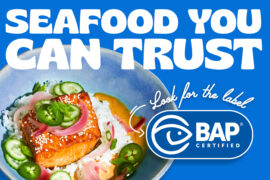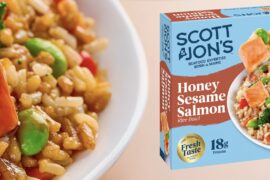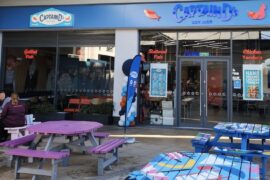The tasty shift in surimi products in the USA of late is toward bolder, more robust flavors accented with herbs and spicy ingredients ranging from garlic and wasabi to Sriracha sauce, jalapeno and chili peppers. Sometimes the heat is dialed up by collaborative R&D and test kitchen personnel at processing plants, and other times it’s creative restaurant chefs who boost the firepower.
“Spicy flavors are currently the trendiest. As more and more US consumers become tolerable of heat and spice, the more they desire spicy flavors,” said Brian Buck of Takasago USA, the Tokyo-headquartered flavor, fragrance and aroma ingredients house that supplies everything from spices and marinades to sauces and gravies.
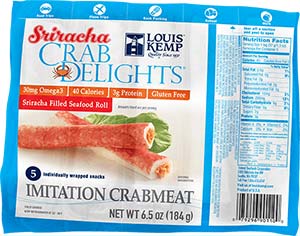 A case in point is Crab Delights Sriracha Filled Seafood Rolls sold under Trident Seafoods’ Louis Kemp label. Individually wrapped in five single-serving packs, they feature wild-caught Alaska Pollock-based surimi sticks infused with tangy Sriracha sauce. Distribution is in 6.5-ounce snack packs.
A case in point is Crab Delights Sriracha Filled Seafood Rolls sold under Trident Seafoods’ Louis Kemp label. Individually wrapped in five single-serving packs, they feature wild-caught Alaska Pollock-based surimi sticks infused with tangy Sriracha sauce. Distribution is in 6.5-ounce snack packs.
Crab Delights Garlic Herb Flake Style Surimi comes in larger eight-ounce packages. In addition to garlic, the recipe features a blend of parsley, oregano, rosemary, and thyme.
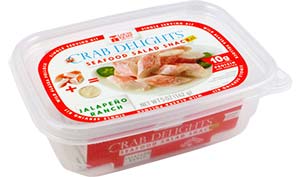 Available in five-ounce tubs are Jalapeno Ranch flavored Seafood Salad Snack Kits. “Eat it. Dip it. Chop it. Mix it,” says the manufacturer. “Step one: Open up Louis Kemp Crab Delights. Step two: Open up your mouth. And there you have it folks – enjoying Louis Kemp is as easy as eating.”
Available in five-ounce tubs are Jalapeno Ranch flavored Seafood Salad Snack Kits. “Eat it. Dip it. Chop it. Mix it,” says the manufacturer. “Step one: Open up Louis Kemp Crab Delights. Step two: Open up your mouth. And there you have it folks – enjoying Louis Kemp is as easy as eating.”
What exactly is surimi? Wikipedia defines it as a Japanese term that literally translates to “ground meat,” but in fact is a paste made from fish and other meat protein to produce a wide variety of foodstuffs that mimic the texture and color of items including crab, lobster and other shellfish.
It goes on to state: “The most common surimi product in the Western market is imitation crab meat…which is often is sold as krab, imitation crab and mock crab in the United States, and as seafood sticks, crab sticks, fish sticks or seafood extender in Commonwealth nations. In Britain the product is sometimes known as Seafood sticks, to avoid breaching trading standards rules on false advertising.”
The production department at Motley, Minnesota-based Louis Kemp defines it this way: “Surimi seafood is real seafood made with Alaska pollock, a mild whitefish related to cod, which is flavored with crab or lobster. To make surimi seafood, Alaska pollock is finely minced and then blended with other ingredients such as starch, salt, natural crabmeat, and egg white. It is then formed, cooked and cut into the various shapes and styles you find at your local grocery store.”
Louis Kemp underscores that surimi is an easy and economical way to add the nutritional benefits of seafood to one’s diet. A good source of omega-3s that is low in cholesterol and calories, the crab substitute is also an excellent source of high-quality protein and naturally low in fat.
Viciunai Innovates in Europe
An innovative producer of surimi products in Europe is the Viciunai Group, a Kaunas, Lithuania-headquartered company operating seven state-of-the-art factories in Lithuania, Estonia, Russia and Spain that produce fish and seafood products as well as pizza, pancakes, dumplings, bread and other items. It ranks as Europe’s largest manufacturer of value-added surimi products, producing more than 82,000 metric tons of finished goods per annum.
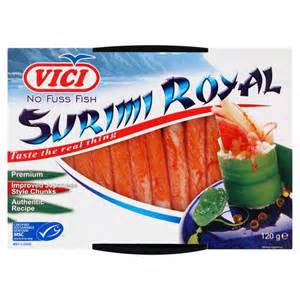 Its extensive Vici brand retail line ranges from Fleur de Surimi and Surimi with Cottage Cheese and Dill Filling, to Crab Sticks with Salmon Filling, Chocolate Surimi Bites with Coconut Filling, Snow Crab Meat Kamciatka and Surimi Royal.
Its extensive Vici brand retail line ranges from Fleur de Surimi and Surimi with Cottage Cheese and Dill Filling, to Crab Sticks with Salmon Filling, Chocolate Surimi Bites with Coconut Filling, Snow Crab Meat Kamciatka and Surimi Royal.
In addition to Crab Sticks, the company’s World of Taste catering assortment includes surimi-based Breaded Crab Claws with Real Pincer, Baby Crab Claws, Lobster Tails and Shrimps Maxi.


